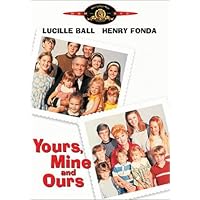
Average Reviews:

(More customer reviews)One can set up a debate between a Jesuit priest supporting the sanctity of life and the secularist dedicated to worldwide birth control, but perhaps the message of the beauty and mystery and wonder of family would be better delivered by this comedy than by a recitation of the catechism. Henry Fonda's character is right: nothing new has been written since "Fanny Hill".
A reviewer wrote that she was disappointed at the children's disrespect toward the adults. But I thought the children's less than perfect behavior was essential to the film and the film's message. Yeah, having children, be it three or eighteen, is a burden. There's no guarantee they'll be grateful for the sacrifices you make for them or that they'll allow you to have any sort of life of your own. The children in the film are not angels. Few are. Indeed, I would argue they're rather normal, with the scales leaning heavily toward good. They're bratty, tender, difficult, warm, self-centered and giving. That's the beauty of life and humanity and it's more or less what Fonda tried to explain to Lucy's oldest daughter when she questioned him about sex. "You tell him that this is what it's all about."
Notice how the film places a certain amount of focus on Tim Matheson's character. Early on, he spikes Lucy's drink and then giggles as she humiliates herself. (Shades of the "Otter" character he would play ten years later.) But eventually he decides that she's not so bad - at about the time, not coincidentally, that he's becoming a man - then he accepts her and, being a natural leader like his father, persuades his siblings to elect her "our mother, for life".
That scene, indeed the whole film, would not have worked had the children been so unrealistically and quickly accepting of the stepmother. As it's played and as it's written, it comes off without the sense of being false or manipulative. Not an easy thing to do in film.
Without meaning any disrespect, I feel a certain amount of pity for the reviewer that grew up in Germany and wrote that they considered families of four or more "trash". (For the sake of Germany, I hope that's not true.) To each his own, I suppose. But if you can't appreciate this film and it's celebration of life and humanity, I'm not sure what you can enjoy. I will say that people that come from large families almost always laugh more than people that do not.
Still, I would not label "Yours, Mine and Hours" family values propaganda. Had that been the intention, there would not have been the classic drunk scene nor the part where a somewhat randy Fonda tells the parking valet, "Keep the motor running." I don't believe they were trying to do anything but tell a warm, funny story. They succeeded tremendously.
Click Here to see more reviews about: Yours, Mine and Ours (1968)
Based on a true story and co-starring Van Johnson and Tom Bosley, Yours, Mine And Ours keeps the laughs coming in a "clean, wholesome family comedy" (Life).This population explosion occurs when widowed Navy nurse Helen North (Ball) meets handsome Naval officer and widower Frank Beardsley (Fonda). They have much in commontoo much in factshehas eight kids and he has ten, and when they tie the knot, anarchy reigns in the Beardsley-North merger. The opposing camps of step-siblings do all they can to sabotage each other and their parents' union. But, through it all, mother lovingly cares for her "troops," while father patiently coaches his coming-of-age kids in more delicate matters, and resentment soon gives way to respect and something bigger than anyone could have imagined!
Click here for more information about Yours, Mine and Ours (1968)

No comments:
Post a Comment